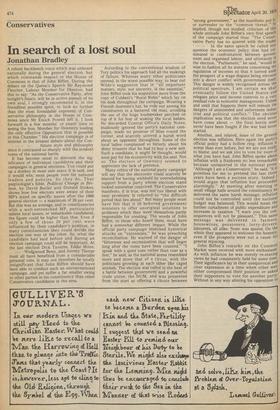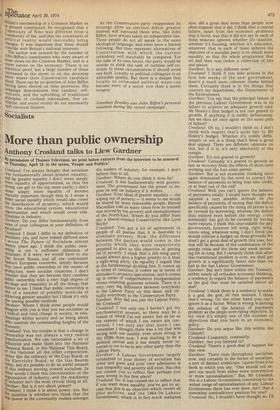In search of a lost soul
Jonathan Bradley
A robust backbench voice which was unheard nationally during the general election, but which commands respect in the House of Commons is that of John Biffen. During the debate on the Queen's Speech Mr Raymond Fletcher, Labour Member for Ilkeston, had this to say: "As the Conservative Party, after tonight's fiasco, will be in active pursuit of its own soul. I strongly recommend it, in the friendliest possible spirit, to look no further than the most formidable exponent of Conservative philosophy in the House of Commons since Mr Enoch Powell left it. I look forward in a few months' or years' time to seeing the hon. Member for Oswestry leading the only effective Opposition that is possible in this Chamber." His election campaign is of interest in the present debate about the Con
future style and philosophy since it contrasted so sharply with the strident tones of the national battle.
It has become usual to discount the significance of individual candidates and their campaigns in general elections. You could put up a donkey in most safe seats, it is said, and it would win; most people vote for national leaders and policies. So they do. That psephologist's bible, Political Change in Britain, by David Butler and Donald Stokes, shows how few electors were aware of their MP's stand on specific issues after the 1966 general election — a maximum of 26 per cent. But this was an average, and in constituencies with a well-entrenched MP, particularly salient local issues, or remarkable candidates, the figure could be higher than that. Even if only a few of those 26 per cent were influenced by their candidate's position, in many constituencies they could decide the election one way or the other. So, what the candidate had said before and during an election campaign could still be important. At the last election Dick Taverne, Eddie Milne,
Wedgwood Benn, and Jeremy Thorpe must all have benefited from a considerable personal vote. It may not therefore be totally insignificant that John Biffen should have been able to conduct such an unconventional campaign, and yet suffer a far smaller swing to other parties in his constituency than other Conservative candidates in the area. According to the conventional wisdom of Tory politics his approach had all the makings of failure. Whereas many other politicians seemed, in the worst possible way, to bear out Wilde's suggestion that in "all important matters, style, not sincerity, is the essential," John Biffen took his inspiration more from the copy of Cobbett's "Rural Rides" which lay on his desk throughout the campaign. Wearing a Finnish dustman's hat, he rode out among his constituents in a battered old mini, avoiding the use of the huge loudspeaker perched on top of it for fear of waking the local babies. He discarded Central Office's Daily Notes, studiously ignored the party's national campaign, made no promise of bliss round the corner, and scarcely uttered a harsh word about an opponent throughout. Some of the local ladies complained so bitterly about his shiny trousers that he had to buy a new suit. Such a candidate, it might be thought, would soon pay for his eccentricity with his seat. Not so. The electors of Oswestry seemed to appreciate the lack of pretence.
Many critics of the national party campaign will say that the electorate could scarcely be blamed for having withheld its overwhelming support from a party whose election stand looked somewhat contrived. The Conservative manifesto, it is true, was not too liberal with easy promises. It referred to "the difficult period that lies ahead." But many people must have felt that it ill behoved government ministers to offer unoriginal solutions to problems which they were themselves partly responsible for creating. The words of John Biffen, to those who heard them, must have had a somewhat different impact. While the official party campaign launched hysterical attacks on "extremists," he was preaching reconciliation. He warned of the danger of "bitterness and recrimination that will linger long after the votes have been counted." "I speak with a quiet tone rather than roar as a lion," he said, as the national arena resembled more and more that of a circus, with the politicians growling at each other like caged animals. The election was called in the heat of a battle between government and a powerful trade union, the NUM, and was presented from the start as offering a choice between
"strong government," as the manifesto put it, or surrender to the "common threat." 1.0 implied, though not studied, criticism of this whole attitude John Biffen's very first speech of the campaign started thus: "The Conservative Party has no quarrel with the trades * In the same speech he called into question the economic policy that had cut" minated in confrontation between government and organised labour, and ultimately In the election. "Parliament," he said, "would be wise to fashion all its statutes concerning the regulation of incomes so that it turned aside the prospect of a wage dispute being elevated into a direct conflict with government itself, This danger is widely recognised across the political spectrum. I am certain we shall eventually follow the United States and . relegate price and income controls to a verY residual role in economic management. Unless and until that happens there will remain the dangers of unintended and unforeseen industrial and political conflict." The obvious implication was that the election need never have come about — the final battle need never have been fought if the war had never started.
Another, and related, issue of the general election was inflation. Here again the partY.s official policy had a hollow ring: inflation is worse than ever before,. but we are not reallY, to blame, and we ask you to vote for more of what you have had. John Biffen spoke about inflation with a frankness no less remarkable because unreported in the national preS• "Although I am a Conservative," he said, "it Is pointless for me to pretend the last three years have been a success story. Indeed I would argue that inflation has proceeded alarmingly." At meeting after meeting In small village halls around the constituency he delivered the same harsh message: inflation could not be controlled until the national budget was balanced. This would mean the, further curtailment of public expenditure and increases in taxation. "I warn you the consequences will not be pleasant." This same message was delivered to farmers, housewives, pensioners, lorry-drivers, labourers, all alike. None was spared. On the whole they appeared to welcome the honesty, even if the prospects were not a cause for general rejoicing.
John Biffen's remarks on the Common Market were received with more enthusiasm. As with inflation he was merely re-stating views he had consistently held for some time. , Their significance lay in their unequivocal and clear expression at a time when other men either compromised their position or asked their supporters to vote for another party, Without in any way altering his opposition to Britain's membership in a Common Market as ; at present constituted, he recognised that a 5 ,Community of Nine was different from a 'ornmunity of Six, and that the constraints of . Political reality would inevitably bring ; changes. It was important that these should ) coincide with Britain's national interests.
. The author was amazed by the number of Ohn Biffen's constituents who were aware of
these views on the Common Market, and to a les ser extent on the economy. There is no statistical proof, but a large number of those canvassed in the street or on the doorstep knew where their Conservative candidate
stood. There can be no question of John Biffen
,? having been elected on false pretences. His 1 caroPaign demonstrates that candour, selfrestraint, and the upholding of traditional Principles of civilised nationalism, free en s terprise, and sound money do not necessarily spell electoral disaster. 5
As the Conservative party reappraises its strategy after an election defeat greater interest will surround those who, like John Biffen, have always taken an independent line. These people do not all speak in the same ideological language, and some have a limited following. But they represent alternatives of Conservatism with which the current orthodoxy will inevitably be compared. For the sake of its own future, the party would be unwise to shirk the task of ruthless self-criticism. In these circumstances it should avoid one fault. Loyalty to political colleagues is an admirable quality. But there is a danger that loyalty to outmoded political ways-can become more of a secret vice than a secret weapon.
Jonathan Bradley was John Biffen's personal assistant during the recent campaign.



































 Previous page
Previous page